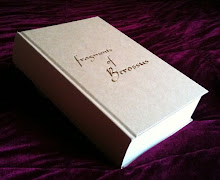Although I have not eschewed all philosophical reading while writing Fragments of Berossus, I have scrupulously avoided anything to do with the major themes of the book, particularly ethics and jurisprudence.
Beginnings...
The Greeks had a word for it: eudaimonia — the good life. Not good in the sense of indulgent, luxurious, happy or pleasurable but rather, in conjunction with arete, in the senses of desirably virtuous, of fulfilment and satisfaction. They were not alone. On every continent the rightness of living has been an abiding issue for all humanity throughout recorded history. Many, with varying degrees of success and acceptance, have spoken or written about how life should be lived. Many more still wonder.
Now, as powers once the sole preserve of mighty nation states are wielded by progressively smaller and smaller entities, as each and every human being perceives how he or she affects the world at large, the question becomes yet more pressing. And so it is asked again: How should we live?
This book does not contain the answer — the question has no ultimate end — but it does offer an answer as the basis for a new beginning. The book is itself a journey — of beginnings and endings and beginning again. Read it and travel — along the way you may remember your own dreams and discover more.
Read it and you will never be the same again. Let it pass unread and still you will be changed. How will you change? The choice is yours.
Now, as powers once the sole preserve of mighty nation states are wielded by progressively smaller and smaller entities, as each and every human being perceives how he or she affects the world at large, the question becomes yet more pressing. And so it is asked again: How should we live?
This book does not contain the answer — the question has no ultimate end — but it does offer an answer as the basis for a new beginning. The book is itself a journey — of beginnings and endings and beginning again. Read it and travel — along the way you may remember your own dreams and discover more.
Read it and you will never be the same again. Let it pass unread and still you will be changed. How will you change? The choice is yours.
Friday, February 5, 2010
Language
Fragments of Berossus is written entirely in prose-poetry: it is neither pure poetry nor pure prose. Like poetry the text makes extensive use of metaphor and imagery, and, like poetry, the sounds, rhythms and cadences of the words are important; but, like prose, the text is simply presented in ordinary paragraphs and there are no rigid metrical or rhyming schemes.
Labels:
Coleridge,
Language,
Prose-Poetry
The Star-Myths
There are sixteen "star-myths" in Fragments of Berossus. With the exception of Vega and Sirius — which were written purely to contain the rest of the book — the various star-myths are genuine excerpts of mythology from extant and extinct cultures across the globe.
The star-myths counterpoint the narrative — they are entirely independent of the story (indeed they can be read in complete isolation) but they shape the perceptions of the chapters to either side, and the book as a whole.
The star-myths counterpoint the narrative — they are entirely independent of the story (indeed they can be read in complete isolation) but they shape the perceptions of the chapters to either side, and the book as a whole.
Labels:
Star-Myths
Monday, February 1, 2010
Readers' Favourite Quotations
This post is specifically for readers to record and comment on their favourite bits of Fragments of Berossus.
Just use the Comment button...
Labels:
Quotations
Subscribe to:
Comments (Atom)
+adjusted+for+blog.jpg)